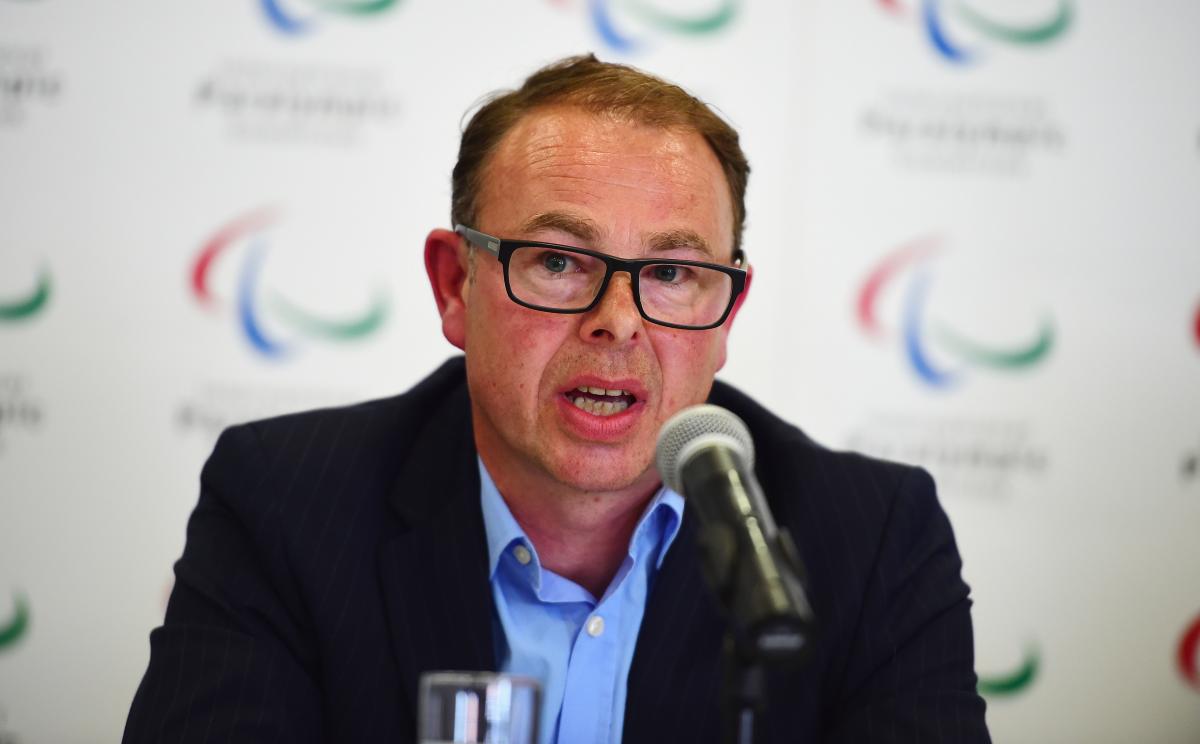Chair of the IPC Taskforce provides Russian Paralympic Committee (RPC) update
Speech by Andy Parkinson on the progress the RPC is making in meeting its reinstatement criteria. 22 May 2017
Andy Parkinson, Chair of the IPC Taskforce
Good afternoon,
The IPC Taskforce was established in December last year to assist the IPC Governing Board in determining whether the Russian Paralympic Committee (RPC) has fully met the detailed reinstatement criteria set out by the IPC following the RPC's suspension last August.
The Taskforce includes figures from around the world who are internationally respected for their work in their respective fields of anti-doping, anti-corruption and Para sport.
It consists of me as the Independent Chairperson; Shin Asakawa, Chief Executive of the Japan Anti-Doping Agency (JADA); Akaash Maharaj, Chief Executive of the Global Organisation of Parliamentarians Against Corruption; Sarah Fussek, FIS Anti-Doping Co-ordinator; and Peter Van de Vliet, the IPC’s Scientific and Medical Director.
The group boasts a wealth of knowledge and experience and together we are doing our utmost to assist the RPC in meeting the required criteria in order to have its IPC membership suspension lifted.
The reinstatement criteria for the RPC were developed in consultation with the World Anti-Doping Agency (WADA) and approved by the IPC Governing Board. They identify the core, high-level requirements that the RPC must meet, and will need to continue to meet, in order to be reinstated as an IPC member.
There are three main criteria that the RPC must meet and demonstrate by both its own efforts, and also by securing the support and assistance of other relevant parties. The three criteria are:
1. The RPC is compliant with all the requirements of the World Anti-Doping Program, the World Anti-Doping Code and the IPC Anti-Doping Code that are applicable to a National Paralympic Committee.
2. The RPC, IPC, International Federations and the Russian Anti-Doping Agency (RUSADA) are all able to carry out their respective anti-doping activities in Russia and in relation to Russian Para athletes and athlete support personnel effectively and without external interference. As part of this, the findings of Professor McLaren must be adequately addressed.
3. As a result, the participation in IPC-sanctioned competitions of Para athletes and athlete support personnel under the RPC’s jurisdiction will not jeopardise the integrity of those competitions.
Supporting the high-level reinstatement criteria are a number of underlying verification criteria which are split into four main areas: establishment of an RPC co-ordination committee; RPC governance and structure; establishment of a strong anti-doping culture; and anti-doping education, testing and results management.
Since the Taskforce started its work we have established a good working relationship and ongoing dialogue with the RPC. We have also met the RPC twice in person - first in December and most recently in early May.
The meetings and our work have always been conducted in a professional and co-operative manner and to-date the Taskforce has been impressed at the encouraging progress made.
The RPC has approached their work with significant enthusiasm, commitment and a real appetite to comply with what has been asked of them by the Taskforce.
Since the last progress report was published in February, the RPC has worked with the Taskforce to develop a detailed roadmap for reinstatement, started improvements to its overall governance and independence, made efforts to work closely with RUSADA on future education programmes, and adopted a practical and realistic approach to its domestic and international testing pools.
The Taskforce would like to place on record our gratitude for the hard work carried out by the RPC to date.
Although positive progress is being made in some areas, the Taskforce continues to have significant concerns regarding the lack of any material progress on a number of fundamental issues. This is despite the RPC’s best efforts in these areas.
A central requirement of the reinstatement criteria is the provision of an official response specifically and adequately addressing the findings made by Professor McLaren.
The evidence is quite clear: the problems identified were far beyond individual athlete violations and a doping system that was not strong enough to catch those athletes. Instead, the system itself and the institutions that support this system were operating with the objective of circumventing the very rules the system was responsible to uphold.
Unless and until these problems are fully addressed, the Taskforce is of the view that there can be no meaningful change in culture, and it would be almost impossible for Russian Para athletes to return to IPC-sanctioned competitions without jeopardising the integrity of those competitions.
The issue of access to Para athletes in closed cities has been a problem for many years and still remains unresolved. The Taskforce welcomes the news from the WADA Foundation Board meeting last week that this may change in the near future.
Finally, the issue of the reinstatement by WADA of RUSADA remains a key criterion for the RPC’s reinstatement. Again, the Taskforce welcomes the news from the WADA Foundation Board meeting last week and the encouraging progress being made with respect to RUSADA's operational capacity. Without a fully functioning RUSADA, testing in the Russian Federation remains severely limited and the Taskforce looks forward to seeing evidence of reform to RUSADA.
In conclusion, while the Taskforce is encouraged by the RPC’s progress, there are a number of reinstatement criteria still to be met. Therefore the Taskforce recommended to the IPC Governing Board at its meeting in Barcelona last Thursday to maintain the RPC’s suspension at this stage.
Thank you.




